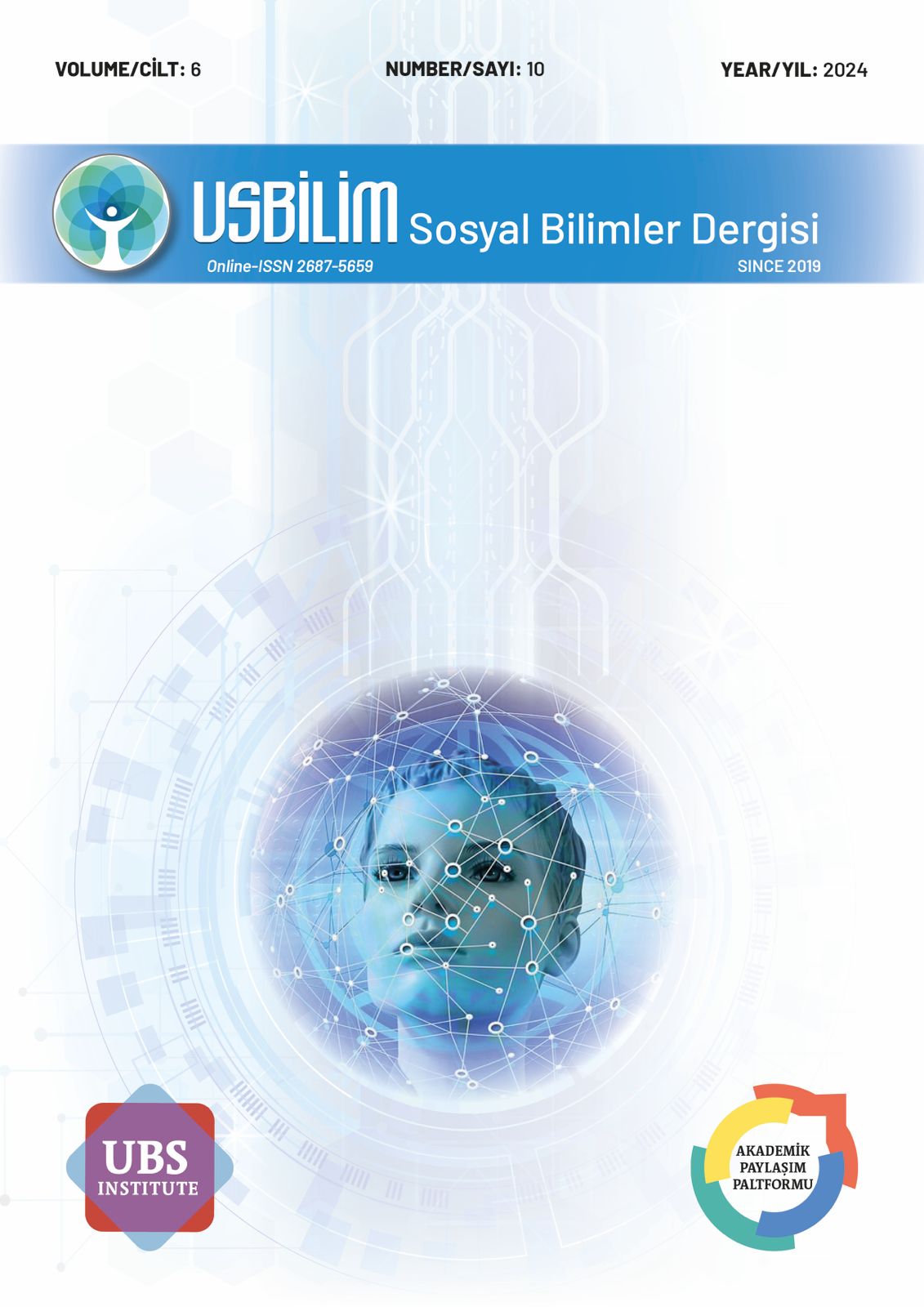TURKEY’S MIGRATION POLICIES: BALANCING INTERNATIONAL OBLIGATIONS AND DOMESTIC POLICY
DOI:
https://doi.org/10.5281/zenodo.11190401Keywords:
Turkey's Migration Policies, International Migration Conventions, EU Migration AgreementAbstract
In this study, which examines the migration dynamics that Turkey faces and the policy structure in the management process of these Dynamics, it is aimed to reveal in detail the role of the interaction between international obligations an the balance in domestic politics on shaping migration policies. The study evaluates Turkey’s policy approaches through the international law framework and immigrant rights perspective and analyzes the possible effects of these policies on both foreign and domestic populations in Turkey. Using the document analysis method, the study considers a range of written materials such as current and past immigration policies, official legislation, international agreements and government declarations. Thanks to this method, a comprehensive evaluation covering a wide period of time and revealing the evolution in the policy structure was made. At the same time, the difficulties inheret in current practices and policies and the way these policies are implemented in the field are examined in detail. The study has the potential to fill existing gaps by adressing the challenges and opportunities faced by Turkey in the field of migration from both national and international perpectives. The study provides important findings that enable us to understand Turkey’s position and the challenges faced by policy makers on issues such as international migration law and migrant workers’ rights in labor market, with an evidence- based approach.
References
Apap, J., Carrera, S., & Kirişci, K. (2004). Turkey in the European area of freedom security and justice. Centre for European Policy Studies.
Bakanlığı, K. (2018). On Birinci Kalkınma Planı (2019-2023) Dış göç politikası özel ihtisas komisyonu raporu.
Castles.S., & Miller J.M. (2008), Göçler çağı- modern dünyada uluslararası göç hareketleri, Çev. Bülent Uğur Bal & İbrahim Akbulut, İstanbul Bilgi Üniversitesi Yayınları.
Çağlayan, S. (2011), Göç kavramı ve kuramları, Ed. Fatime Güneş, Kent Sosyolojisi, Açık Öğretim Fakültesi Yayını, Eskişehir, No:1932, 84-115.
Dönmez Kara, C. Ö. (2015). Göç bağlamında uluslararası işbirliği ve Türkiye’nin politikaları [Doktora Tezi]. Çanakkale On Sekiz Mart Üniversitesi.
Ekinci, M. U. (2016). Türkiye-AB geri kabul anlaşması ve vize diyaloğu. İstanbul: SETA Yayınları, 64.
EnvNet. (2005). Turkey • EnvNet. http://env-net.org/environmental-acquis/approximation-env-net-countries/turkey/
Erdoğan, M., & Kaya, A. (2015). Türkiye’nin göç tarihi. İstanbul: İstanbul Bilgi Üniversitesi Yayınları.
Eren, V., & Çakran, Ş. (2017). Mülteci politikası: avrupa birliği ve türkiye karşılaştırması. Mustafa Kemal Üniversitesi Sosyal Bilimler Enstitüsü Dergisi, 14(39), 1-30.
Europeanenvironment. (2020). Turkey country briefing—The European environment—State and outlook 2015—European Environment Agency [Briefing]. https://www.eea.europa.eu/soer/2015/countries/turkey
İçduygu, A., & Aksel, D. B. (2012). Türkiye’de düzensiz göç. Uluslararası Göç Örgütü Türkiye. http://www.madde14.org/images/1/15/IOMTurkiyeDuzensizGoc.pdf
İçduygu, A., Erder, S., & Gençkaya, Ö. (2009). Türkiye’nin uluslararası göç politikaları 1923 2023 ulus devlet oluşumundan ulus ötesi dönüşümlere. https://avesis.marmara.edu.tr/yayin/c6c7899a-aa82-4a63-9ade-b984304baad9/turkiye-nin-uluslararasi-goc-politikalari-1923-2023-ulus-devlet-olusumundan-ulus-otesi-donusumlere
Koçak, A., & Durgun, A. (2023). Türkiye’nin uluslararası göç politikaları. Uygulamalı Sosyal Bilimler ve Güzel Sanatlar Dergisi, 5(13), 253-273.
Koçak, Y., & Terzi, E. (2012). Türkiye’de göç olgusu, göç edenlerin kentlere olan etkileri ve çözüm önerileri. Kafkas Üniversitesi Iktisadi ve Idari Bilimler Fakültesi Dergisi, 3(3).
Kubicek, P. (2005). The European Union and Grassroots Democratization in Turkey. Turkish Studies, 6(3), 361-377.
Mat, T. Y., &Özdan, S. (2018). AB ile Türkiye arasındaki Geri Kabul Anlaşması’nın insan hakları açısından değerlendirilmesi. Marmara Üniversitesi Hukuk Fakültesi Hukuk Araştırmaları Dergisi, 24(1), 36-49.
Mehmet, K., & Tatar, V. (2024). Kaynak ülkeden hedef ülkeye dönüşen Türkiye ve hedef ülke olmanın getirdiği dezavantajlar. Disiplinlerarası Yenilik Araştırmaları Dergisi, 4(1), 73-81.
Pazarlıoğlu V. M, (2007). İzmir örneğinde iç göçün ekonometrik analizi, Yönetim Ve Ekonomi Dergisi, 14 (1), 121-135.
Şen, M. (2014). Türkiye'de iç göçlerin neden ve sonuç kapsamında incelenmesi, Çalışma Ve Toplum Dergisi, 40 (1), 231-256.
Şehitoğlu, R. (2024). EU-Türkiye Relationswith a Special Focus on Syrian Migrants: Readmission Agreementand the 18 March Agreement. International Journal of Kurdish Studies, 10(1), 98-117.
Tuncel, G., & Ekici, S. (2019). Göçün siyasal etkisi: Suriyeli göçmenlerin Türkiye siyasetine etkisi. Birey ve Toplum Sosyal Bilimler Dergisi, 9(2), 48-72.
Uluslararası Göç Örgütü. (2024). WhoWeAre. International Organizationfor Migration. https://www.iom.int/who-we-are
United Nations A/RES/71/1. (2016). Resolutionadopted by the General Assembly on 19 September 2016.https://documents.un.org/doc/undoc/gen/n16/291/97/pdf/n1629197.pdf?token=bQSEfDtTZhu0wp9DI7&fe=true
United Nations A/RES/71/280. (2017). Resolution adopted by the General Assembly on 6 April 2017. https://www.iom.int/sites/default/files/our_work/ODG/GCM/A-71_280-E.pdf?
Yıldız, A. (2017). Göç olgusu ve göçün ekonomik etkileri: Türkiye örneği, A. Yatkın,(Ed.), 11, 1825-1841.
Zeybekoğlu, E. (2003). Migration and labour in Europe: Views fromTurkey and Sweden. Marmara Univ. Research Center for International Relations.
Downloads
Published
How to Cite
Issue
Section
License
Copyright (c) 2024 Usbilim Sosyal Bilimler Dergisi

This work is licensed under a Creative Commons Attribution 4.0 International License.



